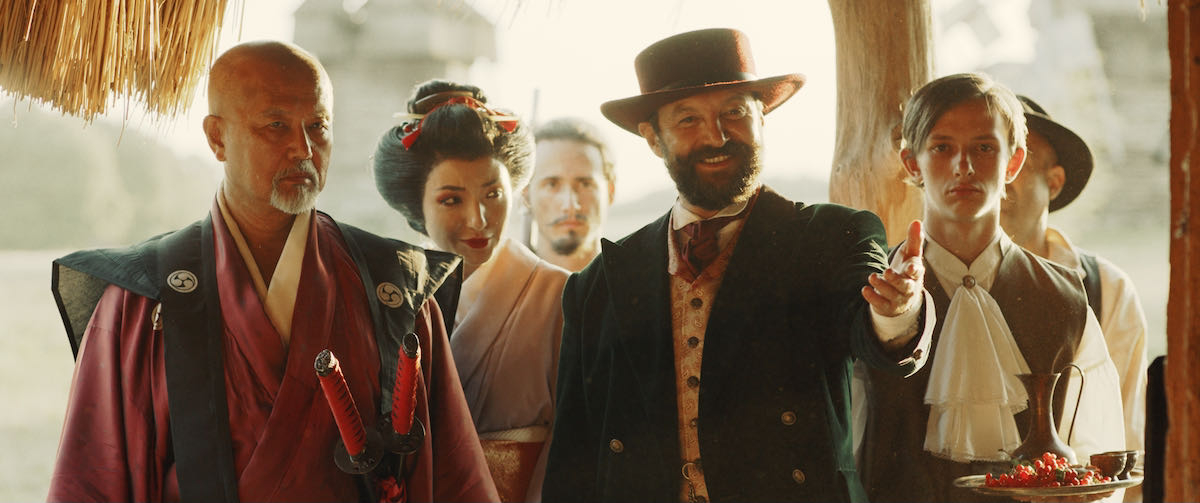
Samurai race through a foggy forest. They stop, stand firm, swords drawn. Black suited ninjas burst into view. A fierce battle ensues, blood gushes, heads and limbs fly through the air. One samurai escapes, runs further into the forest, and emerges in a plantation complete with slaves. Only then are we told the year—1844—and the place? Ukraine.
Say what?
Once Upon a Time in Ukraine is written and directed by a fellow named Roman Refilyev. Once Upon a Time in Ukraine stars Roman Lutskyi, Sergey Strelnikov, and Gen Seto, all Americanized names. The press material calls it alternately a "reimagining of the life of famed Ukranian poet Taras Shevchenko" and "a Quentin Tarantino tribute." It's tough to reconcile the two, but it quickly becomes clear where the film's heart is.
This is pretty standard hero/quest stuff: a samurai named Akayo is in Ukraine to exact revenge on the Japanese Harimoto, who's in cahoots with a Ukrainian slave trader named Jaromir. He encounters and teams up with Taras, whose own mission is to rescue his kidnapped GF Maria from said trader. There are duels, whippings, and burials up to the head. Mix in a band of marauding bandits, a Hassidic gun merchant, and a frontier Dragon Lady, and you have a madcap romp (there's no better word for it), bending genres and tearing its way across familiar terrain, historical accuracy be damned. The film mashes up Tsui Hark's A Chinese Ghost Story, Spaghetti Westerns, and the MCU, defying logic and gravity with a sort of brutal insouciance.
OUATIU's biggest influence is Quentin Tarantino, particularly his Kill Bills and Django Unchained. The film is less homage than it is knock-off. The characters are suitably hard-bitten, the violence stagy and tongue-in-cheek, with dramatic moments turned comic with incongruently contemporary pop tunes punching up the soundtrack. Just as after Pulp Fiction the multiplex was flooded with Pulp Fiction imitators, this one simply apes a different Tarantino epoch. It's watchable enough, but nothing we haven't seen before.
So much for the review. Go see it or not.
A warning: if you would rather just enjoy this frothy entertainment and not consider political implications, read no further.
Given the title, a viewer expecting a uniquely Ukrainian experience will be disappointed. The film is as American as can be, and one wonders why a war-torn country vying for its sovereignty would waste its resources producing these derivative fairy tales and sending them out into the world. The answer is, of course, capitalism.
"International" cinema has become a byword for conformity. A country's film industry defines its identity. Just as one critic proclaimed Luc Besson's La Femme Nikita (1990) "the end of French cinema," the same can be said of OUATIU. This algorithmic approach to storytelling conveys no sense of place or culture other than what the market demands. Can these foreign films out-Tarantino Tarantino? No, they can't. They don't even try. They are uninspired, pale imitations, that only feed our current consuming need for "content."
Of course, not that every film a country produces should be an historical artifact or case for support. The world has changed since the WWII-era American film industry sought to bolster spirits at home and underscore values with its propaganda. A film is more expensive to produce and must appeal to a wider audience than from sea to shining sea. But just as the cinema "mashup" erases time and borders, it renders history generic. The easier to market. Somebody profits. But I'm guessing it's not those suffering through the current war in Ukraine.
The irony, of course, is that an action film's true measure of success is how it plays in China.
In our own brutal insouciance, we're all starting to look alike.
_______________________________________________________
Once Upon a Time in Ukraine. Written and directed by Roman Refilyev. 90 minutes. Released by Samuel Goldwyn Films, April 15, 2023.
